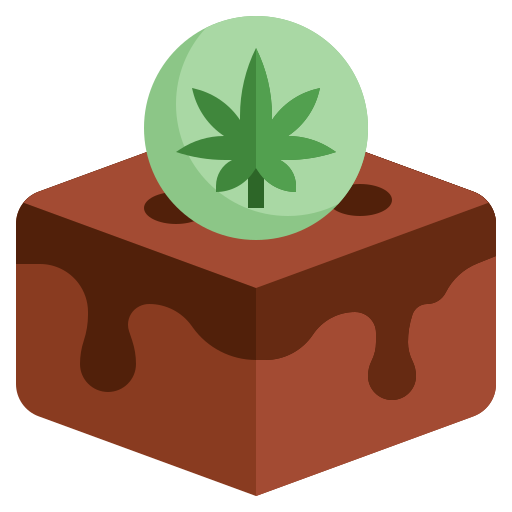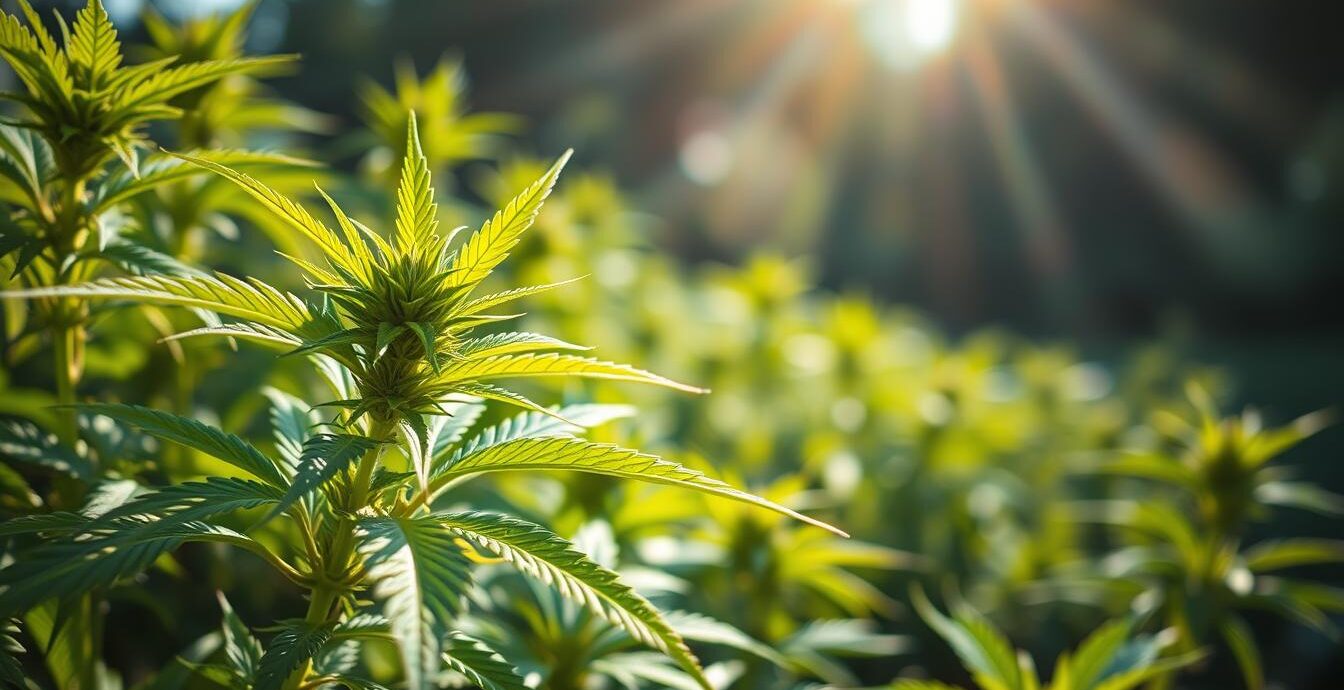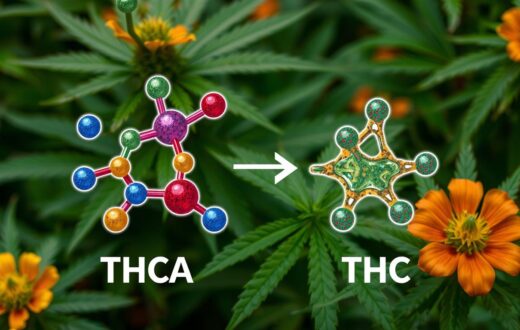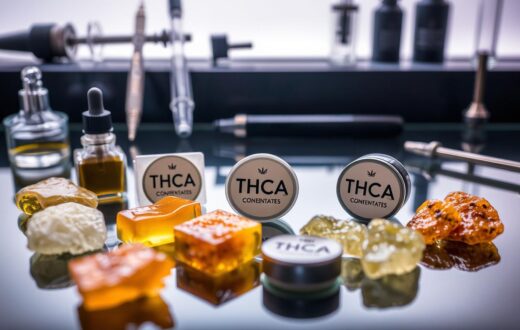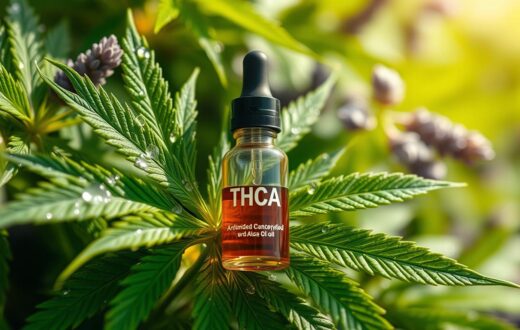Could a non-psychoactive compound from cannabis be the key to managing inflammation? As we explore cannabinoids, THCA stands out as a natural remedy. It offers relief without the high. Let’s see how this compound works in our bodies to soothe inflammation.
THCA, or tetrahydrocannabinolic acid, is found in raw cannabis plants. It’s different from THC because it doesn’t make you high. This has made people interested in its potential to help with inflammation.
Studies show THCA might have anti-inflammatory effects without the high. This makes it a good choice for those wanting cannabis benefits without getting impaired. By understanding how THCA works with our body’s endocannabinoid system, we can see its potential as a natural anti-inflammatory.
Understanding THCA: An Introduction
THCA, or tetrahydrocannabinolic acid, is a compound found in raw cannabis plants. It’s not psychoactive and plays a key role in the plant’s life cycle. It also has potential health benefits. Let’s explore the world of THCA and its unique properties.
What is THCA?
THCA is the precursor to THC, the psychoactive compound in cannabis. But, THCA doesn’t make you high. It’s found in fresh cannabis and turns into THC when heated or exposed to light. This change is why smoking or baking cannabis has psychoactive effects.
Differences Between THCA and THC
THCA and THC have different effects on the body. THC binds to cannabinoid receptors, causing a “high.” THCA doesn’t bind the same way. This makes THCA a good choice for health benefits without the high.
The Role of Cannabinoids
Cannabinoids like THCA interact with our endocannabinoid system. This system has receptors all over the body. THCA may influence our body’s processes. It’s one of over 100 phytochemicals in cannabis, each with its own health benefits.
The Science Behind Inflammation
Inflammation is a key part of our immune response. It helps us fight infections and heal injuries. But, chronic inflammation can cause serious health issues.
What is Inflammation?
Inflammation is our body’s defense mechanism. When we’re hurt or sick, our immune system sends cells to fight off invaders. This leads to redness, swelling, and pain. While it’s usually beneficial, sometimes our body’s response can get too strong.
Types of Inflammation
There are two main types of inflammation: acute and chronic. Acute inflammation is quick and usually heals by itself. Chronic inflammation lasts for months or years, damaging healthy tissue and causing conditions like arthritis or heart disease.
Causes and Effects of Inflammation
Many things can trigger chronic inflammation. Poor diet, stress, and toxins are common causes. The effects can be far-reaching, from joint pain to a higher risk of serious diseases. Knowing these causes and effects is key to managing inflammatory conditions and improving health.
THCA’s Mechanism of Action for Inflammation
THCA is special because it works with the body’s endocannabinoid system to fight inflammation. It’s found in raw cannabis plants. This compound helps without making you feel high like THC does.
THCA and the Endocannabinoid System
THCA doesn’t work like THC with cannabinoid receptors. It doesn’t bind to CB1 receptors, so it doesn’t get you high. Instead, it uses other paths in the endocannabinoid system. This could help with pain and reducing inflammation.
Anti-Inflammatory Properties
Research shows THCA might have strong anti-inflammatory effects. It could help lessen pain and swelling by changing how the body’s immune system works. This makes it interesting for treating arthritis and inflammatory bowel disease.
Studies are looking into its effects on chronic pain. They want to see if it can help without the side effects of regular medicines.
THCA might also protect the brain. Early studies suggest it could help with neurodegenerative diseases. As scientists learn more, we might find even more ways THCA can help our health.
Current Research on THCA for Inflammation
THCA, found in raw cannabis, is getting a lot of attention in medicine. Scientists are looking into its health benefits, especially for fighting inflammation. Let’s explore what research has found about THCA’s anti-inflammatory effects.
Overview of Recent Studies
Research on THCA is still in its early stages, but the results are promising. Scientists are studying how THCA works in our bodies. They’re looking at how it can reduce inflammation and protect our nervous system.
Promising Findings
Early research shows THCA might help with arthritis and lupus. These conditions cause long-term inflammation, and THCA seems to fight it well. Studies also suggest THCA could protect our brains. While more research is needed, the current findings are encouraging for those looking for natural ways to fight inflammation.
Limitations of Current Research
Despite the positive signs, there are challenges in THCA research. Most studies have been on animals, not humans. We need more trials to understand how it works in people. Also, figuring out the right dose of THCA for different health issues is a big task. Scientists are working to overcome these hurdles and fully explore THCA’s benefits.
Advantages of Using THCA for Inflammation
THCA is a natural way to fight inflammation. It has benefits that traditional treatments don’t. This part of the cannabis plant is a good choice for those looking for new ways to handle inflammation.
Non-Psychoactive Properties
THCA is not psychoactive, unlike THC. It doesn’t make you feel high. This makes it perfect for using during the day. You can get its health benefits without feeling altered.
Safety Profile Compared to Pharmaceuticals
THCA might be safer than some medicines for inflammation. People say they have fewer side effects with it. It works with the body’s own systems, possibly offering relief without the bad effects of some drugs.
Potential for Long-Term Use
Studies show THCA could be safe for long-term use. This is good news for those with ongoing inflammation. While more research is needed, the early signs are promising. THCA could be a natural way to manage inflammation over time, with fewer side effects.
How to Use THCA for Inflammation
THCA is a great option for those looking to reduce inflammation. It’s a non-intoxicating compound found in raw cannabis. It comes in different forms, each with its own benefits.
Available Forms of THCA
THCA flower is a favorite among many. It keeps the natural THCA content. THCA diamonds are highly concentrated crystals for a strong effect. For a hassle-free option, try a THCA patch for steady skin delivery. Edibles with THCA are also popular for their ease and precise dosing.
Suggested Dosages
Begin with a 5 mg dose of THCA for inflammation. You can increase as needed. Remember, everyone’s body reacts differently. Always talk to a healthcare professional before starting.
Methods of Consumption
Raw THCA flower can be juiced or blended into smoothies. THCA patches are discreet and last long. Diamonds can be added to food or drinks. Edibles are easy to use. Some prefer smoking THCA flower, but it changes to THC, altering its effects. Pick a method that suits your lifestyle for the best results.
Potential Side Effects of THCA
THCA is usually safe but can cause side effects in some people. It’s different from THC because it doesn’t make you high. Let’s look at the common and rare side effects of THCA.
Common Side Effects
Some users might feel a bit uncomfortable when using THCA products. They might get dizzy, have dry mouth, or feel a bit nauseous. Others might notice changes in their appetite or feel drowsy for a short time. These feelings usually go away as the body gets used to THCA.
Rare but Serious Reactions
THCA can cause serious reactions in rare cases. Allergic reactions can happen, especially when using it on the skin. Some people might get skin irritation or rashes. Smoking THCA can also lead to breathing problems.
Long-term use might affect your memory and thinking skills. It’s also important to watch out for drug interactions. Always talk to a doctor before trying THCA to stay safe.
Legal Status of THCA in the United States
The laws about hemp-derived THCA in the U.S. are complex. Federal and state laws make a confusing mix. The 2018 Farm Bill helps, but THCA’s legal status keeps changing.
Federal Regulations
At the federal level, THCA is okay if it has less than 0.3% THC. This rule comes from the 2018 Farm Bill, which splits hemp from marijuana. But, the worry is that THCA can turn into THC when heated. The DEA is looking into this, which might change THCA’s legal spot.
State-Level Variations
State laws on THCA are all over the place. Some follow federal rules, while others are stricter. For example, Pennsylvania lets THCA flower sales but with rules. Texas has made hemp rules tighter, but California and Colorado are more relaxed.
Because laws keep changing, THCA’s legal status might shift again. It’s key for users to know the local laws to stay legal. As more research on THCA comes out, it could lead to new uses and laws.
Comparing THCA to Other Treatment Options
There are many ways to manage inflammation. THCA, found in raw cannabis, is a natural anti-inflammatory gaining attention. Let’s see how it compares to other treatments.
Herbal Remedies
Traditional medicine uses natural anti-inflammatories like turmeric and ginger. These herbs have been trusted for ages and help many people. THCA, being natural, might offer similar benefits without needing processing.
Over-the-Counter Medications
NSAIDs like ibuprofen and aspirin are popular for fighting inflammation. They’re easy to find and work fast. But, THCA might be a gentler option with fewer side effects for those looking for long-term relief.
Prescription Anti-Inflammatories
For serious inflammation, doctors might prescribe stronger drugs like corticosteroids. Though effective, they can have big side effects. THCA could be a gentler alternative, offering relief without harsh side effects.
It’s important to remember that THCA’s effectiveness is still being studied. Choosing between THCA and other treatments depends on personal needs. With more research, THCA might find its place in anti-inflammatory treatments.
Incorporating THCA into Daily Life
Adding THCA supplements to your daily routine can change your life. THCA is a non-psychoactive part of THC that might help without the high. Let’s see how to make THCA a part of your daily life.
Finding Quality THCA Products
When looking for THCA supplements, choose reputable brands. Make sure they have third-party lab reports for purity. THCA flower, like Gorilla Glue, can have up to 23.9% potency. For even more THCA, try isolates with nearly 100% content.
Best Practices for Use
Begin with small doses of THCA and slowly increase. This helps you find the right amount for your body. Being consistent is important when adding THCA to your routine. Regular use might make its anti-inflammatory effects stronger.
Enhancing Effects with Lifestyle Changes
Using a holistic approach can make THCA’s benefits better. Combine your THCA supplements with a healthy diet and exercise. Stress management, like meditation, can also help. By mixing healthy habits with THCA, you create a full wellness routine that supports your body’s balance.
Testimonials and Case Studies
Patient stories give us a glimpse into how medical cannabis helps with inflammation. These personal accounts show the benefits of THCA for different inflammatory conditions.
Real-Life Experiences
Many people have seen positive changes with THCA for inflammation. One patient said, “THCA cut down my chronic joint pain swelling and discomfort. It’s changed my life.” Another person mentioned better mobility and less need for pain meds.
Insights from Healthcare Professionals
Doctors have seen good results with THCA for inflammation. Dr. Sarah Johnson, a rheumatologist, said, “Some patients have seen big improvements with THCA. More research is needed, but the early signs are promising.”
Dr. Michael Chen did a case study on a patient with chronic inflammatory bowel disease. The patient saw a 40% symptom reduction after three months of THCA. These findings suggest THCA could be a useful addition to traditional treatments.
While patient stories and experiences with medical cannabis are inspiring, remember that results can vary. Always talk to a healthcare professional before trying any new treatment for inflammation relief.
The Future of THCA Research
THCA research is leading to new discoveries in medicine. Scientists are studying its use in treating serious diseases like neurodegenerative ones. This part of cannabis, not psychoactive, is getting a lot of attention for its special qualities.
Emerging Areas of Study
Research into THCA is showing it might protect nerve cells. This could help people with brain diseases. It’s also being looked at for its effects on the mind, which could lead to new treatments for mental health.
Potential Breakthroughs on the Horizon
Creating anti-inflammatory drugs from THCA is a promising area. These could help without the high of THC. Scientists are working hard to improve how to extract and use THCA for medicine. This could change how we treat inflammation-related diseases.
As we learn more about THCA, its importance in the cannabis world is growing. People are using THCA flower as a legal option where THC is banned. Advances in how to extract THCA are making it a key area of study. The future of THCA research is exciting, with many potential benefits ahead.
Myths and Misconceptions About THCA
Learning about cannabis is key to clearing up THCA myths. Many think THCA is the same as THC, leading to confusion. Let’s look at some facts about THCA and debunk common misconceptions.
Debunking THCA Myths
Many believe THCA gets you high. But, THCA is not psychoactive. It’s found in fresh cannabis plants and turns into THC when dried or heated.
This change, called decarboxylation, is what makes cannabis psychoactive.
Clarifying THCA Misunderstandings
Some think THCA has no health benefits. But, studies show it might help with inflammation and protect the brain. Unlike THC, THCA doesn’t interact with brain receptors.
This means it could offer health benefits without causing a high.
Some also think all cannabinoids are illegal. But, the legality of THCA varies. While THC is often banned, THCA might be legal because it’s not psychoactive. Always check local laws before using cannabis products.
Knowing the facts helps users decide if THCA is right for them.
Integrating THCA with Other Therapies
THCA shows great promise in fighting inflammation. When paired with other treatments, it becomes a strong tool for health. This approach aims to tackle inflammation and improve overall well-being.
Complementary Treatment Approaches
Integrative health often mixes THCA with other therapies. This can include acupuncture, physical therapy, or changing diets. By attacking inflammation from different sides, patients can see better results and live better lives.
Synergistic Effects of THCA and Other Therapies
THCA pairs well with other anti-inflammatory substances. For instance, adding CBD to THCA can boost its effects. Some people find relief by using THCA with traditional medicines. This mix can increase benefits and lower side effects.
Always consult a healthcare provider before combining therapies. They can craft a safe and effective plan. By embracing holistic medicine and integrative health, patients can unlock THCA’s full potential in fighting inflammation.
Understanding the Endocannabinoid System
The endocannabinoid system is vital for our body’s balance. It includes endocannabinoids, receptors, and enzymes. These work together to manage many functions.
Components of the Endocannabinoid System
Our bodies make endocannabinoids naturally. These molecules bind to two main types of receptors. CB1 receptors are in the brain and nervous system. CB2 receptors are in the immune system and other tissues.
How THCA Influences Cannabinoid Receptors
THCA is a non-psychoactive compound in raw cannabis. It doesn’t bind to CB1 receptors like THC does. This is why it doesn’t cause a “high.”
Instead, THCA may boost the body’s own endocannabinoids. This helps the system stay balanced. It also has anti-inflammatory and neuroprotective effects.
Studies show THCA could help with arthritis by stopping inflammation. As we learn more about the endocannabinoid system, we see how THCA supports our body’s balance.
Conclusion: THCA’s Potential for Inflammation Management
THCA, the non-psychoactive precursor to THC, is showing great promise in fighting inflammation. It doesn’t cause a “high,” making it a good choice for those looking for relief without getting intoxicated.
Summary of Key Points
THCA offers a unique way to manage inflammation. It works with the TRPA1 receptor, which is key in inflammation. This, along with its potential to protect the brain, makes it exciting for cannabis treatments.
THCA is available in many forms like raw cannabis leaves, tinctures, and juices. It can help with conditions like arthritis and inflammatory bowel diseases. It also shows promise in boosting appetite and easing nausea.
The Importance of Individual Research
As personalized medicine grows, learning about THCA is key. Research is still going on, but it’s important to keep up with new findings. Talking to healthcare providers and doing your own research can help make THCA work best for you. This could change how we manage inflammation personally.

